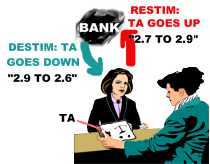Auditor's Code |
|||||||||||||||||||||||||
|
This chapter covers the Auditor's Code in depth.
The Code consists of a set of rules, which guide the auditor's
professional conduct and attitude. It is 'do's and don'ts' that an auditor
follows while auditing someone. The purpose of these rules are to develop
maximum trust between auditor and pc. Maximum trust leads to surest and
most lasting results. It's a joy to be audited by an auditor, who sticks
to this code rigorously all the time. And the definition of In-session: Pc interested in his own case and willing to talk to the auditor. Theses are the guiding principles behind the Code.
THE AUDITOR'S CODE for Standard Clearing Technology Auditors
(1) Never evaluate for the preclear or tell him what he should think about his case in session. Comment: The auditor never tells the preclear what to think about his problems; he never tries to solve the problems for him. He guides the pc to figure it out for himself by using the technology and the processes. The goal of auditing could be said to make the pc fully self-determined. Evaluation would work against that. The pc's Bank and the environment do that to him all the time. Also auditor does not tell pc what written materials or auditing commands mean, but helps pc understand them by clearing up the words and do demonstrations etc.
(2) Never invalidate the preclear's case or gains in or out of session. Comment: Invalidation could be defined as any attempt to nullify another persons ideas or beingness. The auditor never tells the pc what he thinks is wrong with him - or worse, tells him he is wrong about something. Again the whole purpose of auditing is to make the pc self-determined and capable to figure things out for himself. To 'make wrong' or contradict the pc is called invalidation. The auditor accepts the pc's data, but not his orders. He guides the pc firmly but with ARC. Part of ARC is not to invalidate. To do otherwise would break down the pc's self-confidence and trust. (3) Use only the standard application of ST to a preclear in the standard way. Comment: In today's processing we have the benefit of a long development of the subject. Thousands of cases have been put through extensive auditing programs. Therefore we can say, that there aren't any new and unknown case problems that will suddenly sit in the auditor's pc chair. The chapter 'Gross Auditing Errors' covers all instances where the technology apparently isn't effective. You simply have to apply the technology as it is described in ST and you will win to the degree you adhere to the standard procedures. (4) Always keep all auditing appointments once made. Comment: Cases have been known to fail, not because of the auditing, but because the auditor was bad at keeping appointments; this made his pc's anxious about waiting or being stood up. The auditor was indirectly telling the pc that he was not important or of little interest. If an auditor has difficulty in keeping appointments he should not make specific appointments in the first place. (5) Do not process a preclear who has not had sufficient rest and who is physically tired. (6) Do not process a preclear who is improperly fed or hungry. Comment: A tired or hungry pc is not up to his best when it comes to confronting his Bank. The best process will not benefit a pc, who is being drained by a body badly in need of food or sleep. Every bit of energy which the thetan puts out is being absorbed by the body. Extreme tiredness and hunger can lead to nervous breakdowns all by themselves. Therefore it is important to educate the pc on it and check these factors to ensure they are taken care of beforehand. (7) Do not permit a frequent change of auditors. Comment: As much as possible a pc should be audited by one auditor. One good reason for this is, that one auditor running a case has a better chance of completing what he starts. A frequent change of auditors nearly always means a frequent change of estimates of a case. It also tends to make the pc feel he has to tell his story all over again and that he is less important. (8) Do not sympathize with a preclear, but be effective. Comment: Compassion and sympathy are two different things. To sympathize is to feel sorry for and apparently agreeing with the pc's difficulties. It is very low on the emotional tone scale. To be effective the auditor has to stay high on the tone scale and guide his pc to get through his difficulties. The auditor has to stay positive and have understanding but be insistent to be effective.
(9) Never let the preclear end session on his own determinism, but finish off those cycles begun. Comment: The pc can occasionally become scared and want to run away from his Bank. The auditor is there to make sure pc gets through temporary difficulties and reaches the EP of the process. There is a basic rule of auditing: "The way out is the way through". 'To spare a pc from emotional stress' is not part of auditing. The auditor will on purpose restimulate one little part of the Bank and ensure it gets handled to VGI's. (10) Never walk off from a preclear in session. Comment: 'Auditor plus pc is greater than the Bank'. If the auditor walks off for any reason he violates this basic law. (11) Never get angry with a preclear in session. Comment: This would be a form of invalidation. The pc must feel safe enough to close his eyes and look into his Bank. The pc is In-session when he is interested in his own case and willing to talk to the auditor. An angry auditor would make this impossible.
(12) Always run a major case action to its end phenomenon. Comment: This is related to (9), but there is more to it. The auditor has to ensure that the pc gets the full benefits available from a process by not ending off too soon. The auditor controls the session and knows what he is going for - the End Phenomena for that process. (13) Do not run any one action beyond its end phenomenon. Comment: A process can be overrun, meaning beyond a point where it has culminated (EP'ed). The auditor has to stay alert and know the exact point when the EP is reached. Overruns can be rehabbed, but will cause the pc to loose a little bit of trust and confidence.
(14) Always grant beingness to the preclear in session. Comment: In (8) we
had 'don't sympathize'. 'Grant Beingness' is a lot different. The ability
to grant (give, allow) beingness or life to others is probably the highest
of human virtues. It is even more important to be able to permit (allow)
other people to have beingness than to be able oneself to assume it.
(15) Do not to mix the processes of ST with other practices except when the preclear is physically ill and only medical means will serve. Comment: If pc currently is involved with other practices the auditor should find out from 'pc information sheet' or interviews. For ST to be effective it has to be allowed to work. If pc depends on several types of therapy simultaneously there is probably a physical condition or a huge problem in his life. Make sure pc gets any medical assistance needed. Then the auditor can handle the case aspects of the condition with the pc fully there. ST is effective when allowed to work.
(16) Always maintain good Communication with the preclear and do not cut his communication or let him overrun in session. Comment: A
mechanical or frozen approach won't do the trick. Don't mistake the
discipline of the TR's for that. Only live communication will make the
processes work. The skilled auditor is disciplined, alert and alive and
has his attention on the pc. The live theta energy of the auditor's
communication is perceived by the pc and makes him capable of As-ising his
Bank piece by piece. It comes down to,
(17) Never enter comments, expressions or enturbulence into a session that distract a preclear from his case. Comment: Give the pc peace and quiet. Take care of 'behind the scenes' business without involving the pc. To distract the pc from his case violates pc being in session. He needs to have his attention on his case.
(18) Always continue to give the preclear the process or auditing command when needed in the session. Comment: In (9) we had "The way out is the way through". There is another rule "What turns it on will turn it off". It can occasionally look like the pc is getting nowhere or things are getting worse. But when auditor keeps the pc going, it will soon be clear, that there is a way through the process and a real EP. Since all the processes published are fully researched and tested, the auditor can go ahead with confidence. His confidence will be picked up by the pc and help them get to the EP.
(19) Do not let a preclear run a wrongly understood command. Comment: Part of every process is clearing the commands or questions. This is done with dictionaries, etc. Auditing is simple: you ask a question the pc understands and can answer. Auditor gets all the answers pc has in his Bank and acknowledges each. As a result the pc will As-is something and feel better. If the pc responds to a misunderstood command you have no guarantees as you are not running the process. (20) Do not try to explain, justify or make excuses in session for any auditor mistakes whether real or imagined. Comment: Related to (17). Also if you start to do the above, you break down the pc's confidence and it may start arguments. Positive control and a non-defensive attitude accounts for smooth, professional auditing.
(21) Always estimate the current case state of a preclear only by Standard Case Supervision data and do not diverge because of some imagined difference in the case. Comment: There is a known remedy for any pc situation. The case supervisor has a lot of technology not included in every level. When he between sessions looks over the reports and ensures that everything is done right, the auditor will know the best course is taken. Any factors outside his training level is taken into consideration as well. That is Standard Case Supervision. Also: You take a pc's data, but not his orders. You use your technical knowledge to determine what is going on.
(22) Never use the secrets of a preclear divulged in session for punishment or personal gain. Comment: There is a client/practitioner privilege. The auditor is sworn to secrecy and confidentiality in a similar manner as lawyers, doctors and priests. If this is violated pc's willingness to speak to the auditor would not exist or be lowered seriously.
(23) Do not falsify auditing reports or worksheets. Comment: The case supervisor needs the raw data to be able to supervise auditing correctly. Auditors that cover up or explains away mistakes are not doing themselves or pc's any favors. Auditor mistakes can easily be corrected in the auditor and the pc, but the C/S has to know exactly what was done to be able to do that.
(24) Do not advocate ST only to cure illness or only to treat the insane, as it is intended for spiritual gain. Comment: Processing has been known to have a positive effect on people's health and even psychiatric conditions. The auditor can not legally, and should never, make any promises. He is pursuing spiritual goals and gains. The spirit or thetan can suddenly and unpredictably change things around and make medical conditions disappear; but there are no guarantees for how or when such a condition would change.
|
|||||||||||||||||||||||||


































